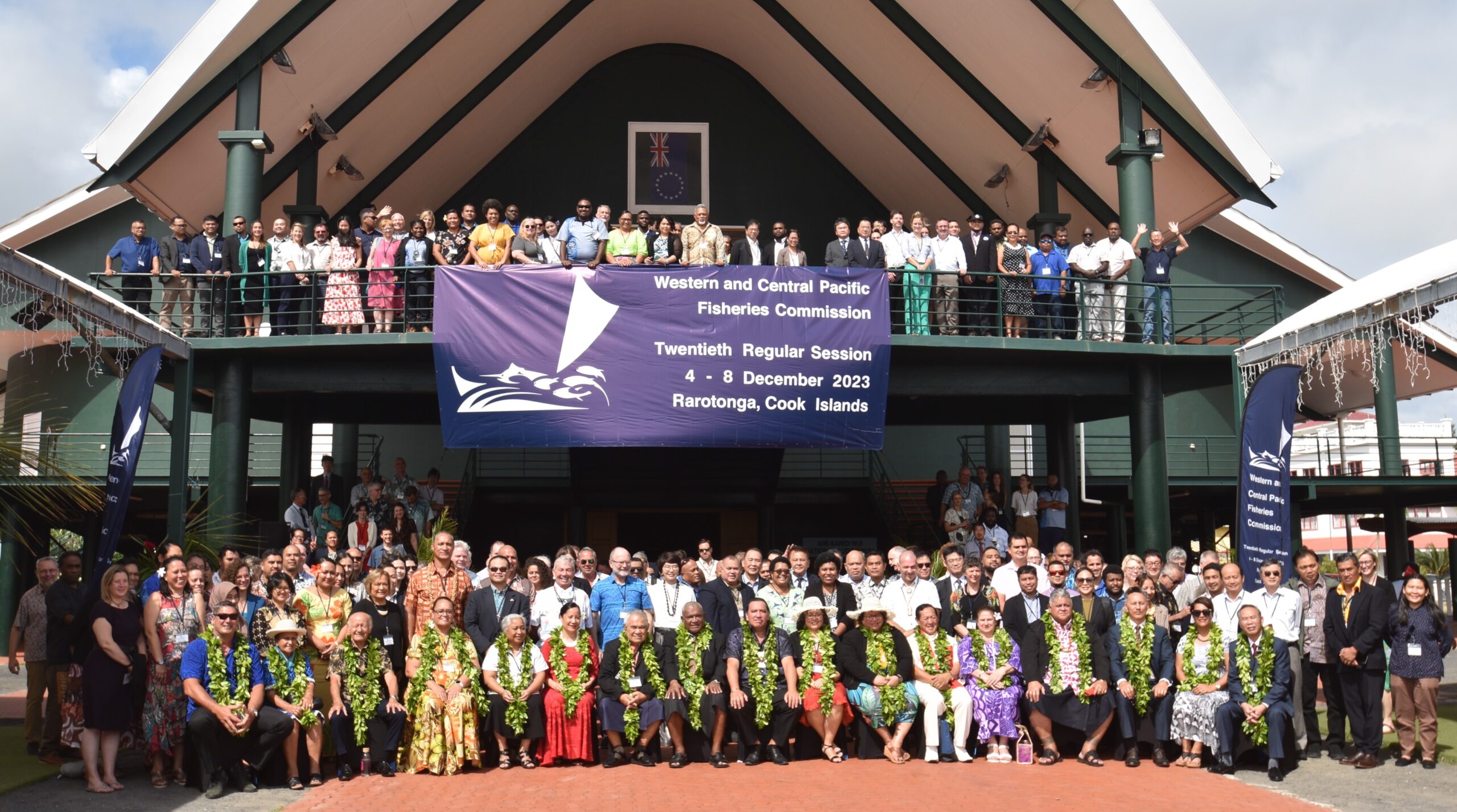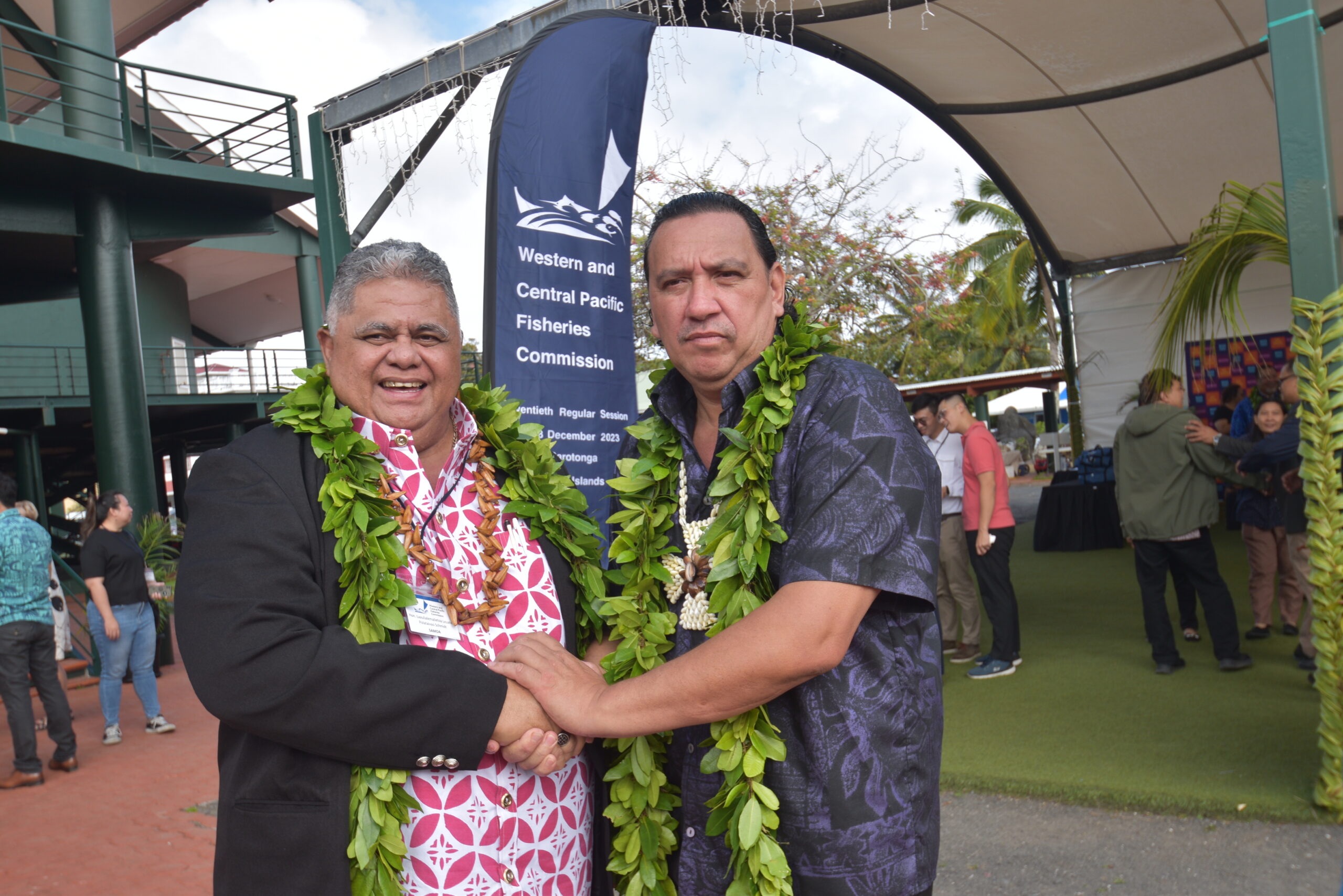Climate change, overfishing: Pacific tuna faces ‘unprecedented challenges’
Tuesday 5 December 2023 | Written by Melina Etches | Published in Environment, National, Regional

The opening ceremony of the 20th Western and Central Pacific Fisheries Commission (WCPFC20), family photo of all delegates at Te Are Kariori (National Auditorium). MELINA ETCHES/23120410
The annual regional fisheries meeting to discuss and address crucial matters concerning tuna fisheries and the marine ecosystems they inhabit began yesterday with a traditional welcome and official opening ceremony at the National Auditorium.
Cook Islands, like many Pacific Island nations, relies heavily on fisheries as a cornerstone of its economy and a vital source of nutrition, said Deputy Prime Minister Robert Tapaitau at the opening of the 20th Western and Central Pacific Fisheries Commission (WCPFC20) yesterday.
“But as the world’s largest tuna fishery, producing almost 3 million metric tons, and valued at $6 billion dollars, we also feed and employ billions of other people around the world,” Tapaitau said.
He said the week-long meeting will discuss and address crucial matters concerning our tuna fisheries and the marine ecosystems they inhabit.
In addition, Tapaitau said the presence of hundreds of delegates at the WCPFC20 reflects a shared commitment to the sustainable conservation and management of Western and Central Pacific Ocean tuna resources.
In his speech, Tapaitau noted that the Pacific Ocean is not only a vast expanse of water but also a critical source of sustenance and livelihoods for our people.
“Here in the Cook Islands our Marae Moana is sacred,” he said. “The well-being of our ocean is crucial to the prosperity of our Pacific nations and the preservation of our cultural heritage.”
“The responsibility placed upon us all as stewards of these resources is immense, and we must act with integrity and prudence to ensure their preservation for generations to come.”
Tapaitau was pleased to see the commitment the Commission had made by integrating climate change considerations into the fisheries management frameworks, better safeguarding the region's marine resources.
In the face of unprecedented challenges, such as overfishing, marine pollution, and the impacts of climate change, he noted the Commission’s role had become even more critical.
“The sustainable management of fisheries is relentlessly linked to the well-being and prosperity of our Pacific communities,” Tapaitau said.
“We recognise that achieving this must be done hand-in-hand with all delegations around this table.
“As a shared resource, this forum provides you with a unique opportunity to engage in constructive dialogue, share best practices, and forge partnerships that will pave the way for sustainable fisheries management.
“By working together, we can develop innovative solutions, implement effective policies, and promote responsible practices that will safeguard the health and resilience of our oceans and tuna resources.”

Deputy Prime Minister Robert Tapaitau (right) with La’aulialemalietoa Schmidt, the Minister of Agriculture and Fisheries for Samoa. MELINA ETCHES/23120412
Dr. Josie Tamate, the Western and Central Pacific Fisheries Commission chair, briefly outlined her top priorities as the head for this week’s meetings.
From her perspective, the Tropical Tuna Conservation Management Measure is the highest priority, and Tamate is optimistic that the Commission can adopt a revised version of this measure during this meeting.
Dr Rhea Moss-Christian, WCPFC executive director, is the first woman to hold both the chair and executive director roles.
In her opening remarks, Moss-Christian noted the important milestone of the 20th regular session marking two decades of significant work and achievements to secure the world’s largest tuna fishery.
“Our ocean region supports millions of people all over the world with its rich and abundant green diversity and being here reminds us of the stewardship that Pacific Island people have been exercising over our main resources for centuries,” she said.
“Our regions tuna, and tuna like resources make up over 60 per cent of the global supply…”
Moss-Christian emphasised the immense stakes involved, not just globally, but also in the livelihoods of fishing crews and companies, and the critical dependence of populations around the world on these fisheries for income and food security.
Despite the challenges, she stated that the ability to bind diverse stakeholders together under a single convention to manage the world’s largest tuna fishery remained commendable.
It was, she said, “worthy of the time, the efforts and all of the resources that go into collecting and organising multiple interest into a single output for a single objective that is to ensure through effective management the long-term conservation and stable use of highly migratory fish stocks in the Western and Central Pacific Ocean”.
Pamela Maru, Ministry of Marine Resources (MMR) secretary, noted: “The hosting of WCPFC20 is not just about meetings; it’s about reinforcing the shared responsibility for managing our shared tuna stocks, whilst ensuring Pacific SIDS (small islands developing states) as large ocean states continue to enjoy access to these resources.”
“Cook Islands, with its rich heritage and commitment to sustainability, welcomes the international community to share in our vision for a thriving Pacific.”
Maru further reflected on Cook Islands’ history with WCPFC, having hosted the Scientific Committee in August 2017 and the 5th Preparatory Conference in September 2003.




































